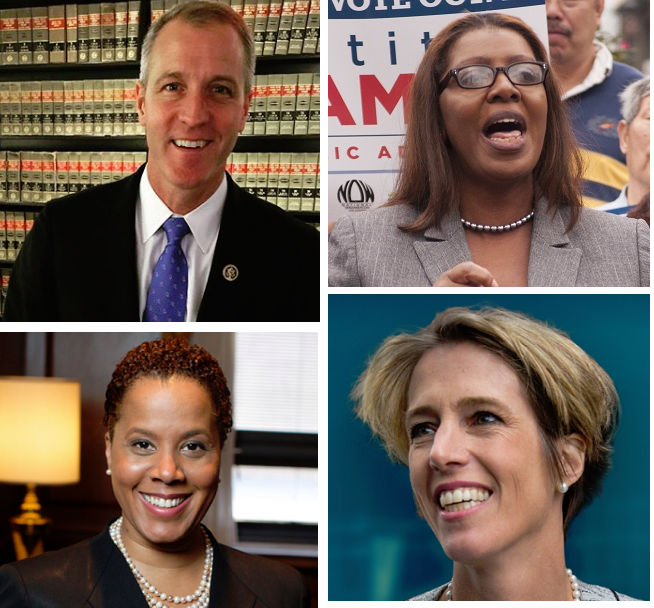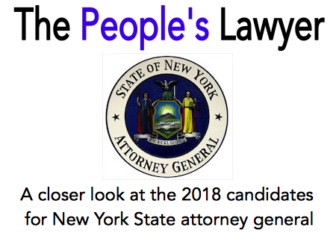
Matthew Cohen, Zephyr for New York, Leecia Eve for Attorney General, Rep. Maloney
Democrats for attorney general, clockwise from top right: Letitia James, Zephyr Teachout, Leecia Eve and Sean Patrick Maloney.
The Democratic candidates running for Attorney General faced off Thursday night in their third and final debate before next week’s Primary Election, as they look to fill the seat formerly held by Eric Schneiderman, who resigned in May amid abuse allegations.
The four contenders—New York City Public Advocate Tish James, Verizon executive Leecia Eve, law professor Zephyr Teachout and Hudson Valley Congressman Sean Patrick Maloney—largely agreed on a number of big-picture issues, including the need to funnel out corruption in Albany and to protect New Yorkers against voter suppression and predatory financial institutions. They instead attacked one another’s individual records, sparring over who has the most litigation experience and who’s taken campaign cash from corporate donors.
There was one topic, however, that the four candidates agreed upon the most: the need for the next attorney general to protect New York against the “threat” of the Trump administration, and to use the office to investigate potential wrongdoing by the president and the Trump Organization.
“Donald Trump is a clear and present danger because he is a crook and a bigot and he has a bull’s eye on New York,” Maloney said during his opening statement at the start of the 90-minute event, which took place at The Cooper Union’s Great Hall and was moderated by former U.S. Attorney Preet Bharara and WNYC’s Brian Lehrer. “We should understand the threat to our values and our state.”
On local issues, all of the candidates expressed a desire to protect and strengthen New York’s voting laws—which Susan Lerner of good-government group Common Cause New York called “antiquated” in her question to the panel—including the need for no-excuse absentee ballots, combining federal and state elections to take place on the same day and increasing election oversight to prevent incidents like the Brooklyn voter purge in 2016.
But the candidates were less agreeable on other points. Throughout the debate, Maloney, Eve and James each lobbed their own attacks on Teachout—perhaps a response to the fact that the New York Times’ editorial board endorsed the Fordham law professor last month.
They sought to paint Teachout, who hails from Vermont, as an outsider, criticizing her for only very recently getting sworn into the New York bar and for the fact that she was reprimanded by the North Carolina State Bar for not notifying it that she’d moved out of the state while representing a Death Row inmate there.
“I didn’t grow up on a farm in Vermont,” Eve said in one jab that drew murmurs from the crowd. “I welcome you to New York, as a lawyer.”
Teachout defended her background, saying she’s been a lawyer for 17 years and that both New York and North Carolina, where she previously practiced law, recognize the licenses of attorneys from other states.
She sought to set herself apart from her competitors, saying she’s the only one of the four candidates who’s refused to accept campaign money from LLCs during the race, and that she’ll be the most aggressive when it comes to holding banks and other financial institutions accountable.
“I am ready to be the next sheriff of Wall Street,” she said before lashing out at Maloney, whom she’d filed a lawsuit against just hours earlier on Thursday. The suit accused him of illegally transferring funds from his congressional campaign to his AG campaign, which Teachout says exceeded campaign finance contribution limits.
Maloney countered that his campaign has operated “by the book” and said the lawsuit had already been “tossed out”—a claim that Teachout called “simply false,” saying the case is moving forward. (The judge in the case denied Teachout’s request for an immediate injunction to stop Maloney’s campaign from using the funds in question but her campaign says the lawsuit is still active.)
Public Advocate Tish James, who has the Democratic party’s endorsement in the race, was also called to defend her campaign finances. Lehrer asked about the cash she’s received from real-estate interests, citing a New York Post story from July that found nearly one-fifth of her war chest came from landlords and developers.
“The reality is that I will not be disadvantaged, and I do not want to unilaterally disarm,” she said, asserting that her competitors have taken LLC donations “in one form or another” and that she supports public financing of campaigns on the state level.
“Individuals who have supported me in the past, and who have endorsed me, I’ve sued them. I’ve sued the mayor of the city of New York at least 10 times—he supported me,” she quipped, saying if elected she would be “independent, unbossed and unbought.”
The moderators then turned their questioning to Eve, the only candidate in the race who has refused to release her tax returns to the public, despite having previously called on Trump to release his.
“I, in contrast to most of my opponents, have not had a taxpayer-funded job for most of my life,” said Eve, who is currently on leave from her job as Vice-President of State Government Affairs (NY/NJ/CT) for Verizon.
While she hasn’t released her returns, Eve countered that she’s been “extraordinarily transparent and open” with her finances by detailing them on a number of disclosure forms. She eventually stated that she would release her tax returns if she earns the Democratic nomination next week.
(As Norman Oder reported here last week, Eve’s tax returns might shed light on such things as tax strategy and charitable contributions.)
The debate wrapped up with Lehrer asking each candidate what single law they would like to see changed to make New York a better place: Eve said hers would be repealing Civil Rights Law 50-a to allow police officers’ misconduct records be released to the public; Maloney said protecting reproductive rights; James said preferential rent and vacancy decontrol; Teachout said corruption in Albany.
The Primary Election takes place Sept. 13. The winner will go on to compete against Republican Keith Wofford, Libertarian Chris Garvey and the Green Party’s Michael Sussman in November’s General Election.









